

Machine Learning. Artificial intelligence (#AI) and machine learning (#ML) have shown significant progress in recent years, and their development has enabled a wide range of beneficial applications. by @_sciforce_ Column: Artificial intelligence: Are we there yet? - The Columbus Dispatch.
How Artificial Intelligence Could Save Psychiatry. “Artificial Intelligence technology will have the biggest impact on the legal industry. It removes the labor-intensive intake, document review, and contract analysis. Increased use of this newer technology provides more opportunities. Get on board with us. Artificial Intelligence Courses - Learn AI Online. What is Artificial Intelligence (AI)?
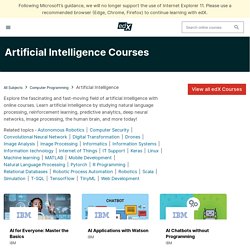
Artificial Intelligence is the ability of machines to seemingly think for themselves. AI is demonstrated when a task, formerly performed by a human and thought of as requiring the ability to learn, reason and solve problems, can now be done by a machine. A prime example is an autonomous vehicle. The vehicle is able to perceive its surroundings and make decisions in order to safely reach its destination with no human intervention. Converging technologies along with Big Data and the Internet of Things (IoT) are driving the growth of AI. 7 Ways An Artificial Intelligence Future Will Change The World. “[AI] is going to change the world more than anything in the history of mankind.
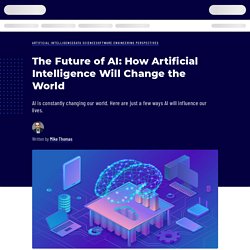
More than electricity.”— AI oracle and venture capitalist Dr. Kai-Fu Lee, 2018 In a nondescript building close to downtown Chicago, Marc Gyongyosi and the small but growing crew of IFM/Onetrack.AI have one rule that rules them all: think simple. The words are written in simple font on a simple sheet of paper that’s stuck to a rear upstairs wall of their industrial two-story workspace. Benefits & Risks of Artificial Intelligence. Many AI researchers roll their eyes when seeing this headline: “Stephen Hawking warns that rise of robots may be disastrous for mankind.” And as many have lost count of how many similar articles they’ve seen.
Typically, these articles are accompanied by an evil-looking robot carrying a weapon, and they suggest we should worry about robots rising up and killing us because they’ve become conscious and/or evil. On a lighter note, such articles are actually rather impressive, because they succinctly summarize the scenario that AI researchers don’t worry about. That scenario combines as many as three separate misconceptions: concern about consciousness, evil, and robots. If you drive down the road, you have a subjective experience of colors, sounds, etc. The fear of machines turning evil is another red herring. The consciousness misconception is related to the myth that machines can’t have goals.
The robot misconception is related to the myth that machines can’t control humans. How China Is Using Artificial-Intelligence In Classrooms. Artificial Intelligence a threat to humanity? Robotics & Artificial Intelligence - Threats to Humanity? Elon Musk: artificial intelligence is our biggest existential threat. Elon Musk has spoken out against artificial intelligence (AI), declaring it the most serious threat to the survival of the human race.
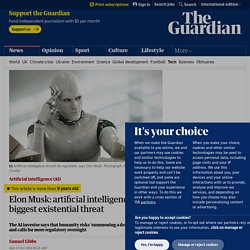
Musk made the comments to students from Massachusetts Institute of Technology (MIT) during an interview at the AeroAstro Centennial Symposium, talking about computer science, AI, space exploration and the colonisation of Mars. “I think we should be very careful about artificial intelligence. If I had to guess at what our biggest existential threat is, it’s probably that. So we need to be very careful,” said Musk. “I’m increasingly inclined to think that there should be some regulatory oversight, maybe at the national and international level, just to make sure that we don’t do something very foolish.” Is artificial intelligence a threat to humans? The Real Threat of Artificial Intelligence. Artificial Intelligence a threat to humanity? Is Artificial Intelligence a Threat. The Ethical Threat of Artificial Intelligence in Practice. Sztuczna Inteligencja – śmiertelne zagrożenie czy szansa dla ludzkości? „Problem? Nie potrafimy przekazywać zadań”
Dzie znaleźć można najbardziej skomplikowaną sieć na świecie?
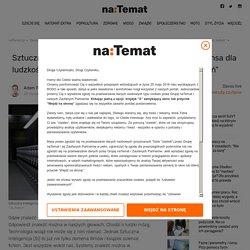
Odpowiedź znaleźć można w naszych głowach. Chodzi o ludzki mózg. Technologia wciąż nie może się z nim równać. Jednak Sztuczna Inteligencja (SI) to już nie tylko domena filmów i książek science fiction. Jest wszędzie wokół nas. Sztuczna inteligencja szanse i zagrożenia opinie. Dr Dominik Batorski, reprezentujący firmę Sotrender oraz Interdyscyplinarne Centrum Modelowania Matematycznego i Komputerowego Uniwersytetu Warszawskiego uważa, że sztuczna inteligencja niesie za sobą zarówno szanse, jak i zagrożenia. - Bardzo ciekawym trendem, nie tylko związanym ze ściśle rozumianą sztuczną inteligencją, ale generalnie z wykorzystaniem danych i algorytów, jest podejście predictive maintenance.

Sztuczna inteligencja zagrożenia. Na co wyrażasz zgodę?

Klikając przycisk "Przejdź do serwisu" lub zamykając to okno za pomocą przycisku "x" wyrażasz zgodę na przetwarzanie, w tym profilowanie* przez Polska Press Sp. z o.o. oraz naszych Partnerów, Twoich danych danych osobowych zapisanych w plikach cookies i im podobnych technologiach stosowanych w Serwisach przez Polska Press i Partnerów w celu marketingowym, obejmującym analitykę w celach marketingowych oraz wyświetlanie spersonalizowanych ofert, reklam i innych usług w Serwisach Polska Press Sp. z o.o. oraz w Internecie. Pamiętaj, możesz w każdej chwili nie wyrazić zgody lub cofnąć zgodę na przetwarzanie Twoich danych osobowych.
Szczegóły dotyczące wycofania i niewyrażenia zgody znajdziesz w ustawieniach. Sztuczna inteligencja vs. ludzkie podejście. KONIEC ARTYSTÓW JEST BLISKI - GRAFIK vs SZTUCZNA INTELIGENCJA. Historia sztucznej inteligencji. Maszyny, które nas otaczają, mają za zadanie usprawnić życie człowieka i pomagać mu w codziennych obowiązkach.
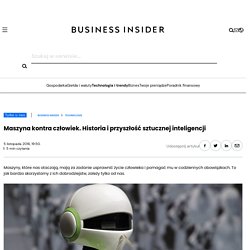
To jak bardzo skorzystamy z ich dobrodziejstw, zależy tylko od nas. Mówiąc o historii sztucznej inteligencji, można wspomnieć słynną Enigmę i angielskiego uczonego Alana Turinga. Jego badania w czasie II wojny światowej, opierające się na dokonaniach polskich matematyków i kryptologów, doprowadziły do rozszyfrowania niemieckich kodów maszyny szyfrującej Enigma, tworząc coś na kształt pierwszego komputera o mocy 10 do potęgi 114. Maszyna potwierdziła założenie Turinga, że przyszłością są algorytmy, których zadaniem jest wykonywanie skomplikowanych obliczeń matematycznych. Do czego zdolna jest sztuczna inteligencja? 7 imponujących ciekawostek o sztucznej inteligencji. Why Human Intelligence and Artificial Intelligence Will Evolve Together, by Stephen Hsu.
When it comes to artificial intelligence, we may all be suffering from the fallacy of availability: thinking that creating intelligence is much easier than it is, because we see examples all around us.

In a recent poll, machine intelligence experts predicted that computers would gain human-level ability around the year 2050, and superhuman ability less than 30 years after.1 But, like a tribe on a tropical island littered with World War II debris imagining that the manufacture of aluminum propellers or steel casings would be within their power, our confidence is probably inflated. AI can be thought of as a search problem over an effectively infinite, high-dimensional landscape of possible programs.
Nature solved this search problem by brute force, effectively performing a huge computation involving trillions of evolving agents of varying information processing capability in a complex environment (the Earth). But there is hope. Human vs Artificial Intelligence: Who Wins at Sales? “Sell me this pen.”
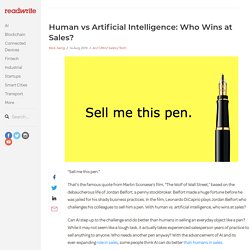
That’s the famous quote from Martin Scorsese’s film, “The Wolf of Wall Street,” based on the debaucherous life of Jordan Belfort, a penny stockbroker. Belfort made a huge fortune before he was jailed for his shady business practices. In the film, Leonardo DiCaprio plays Jordan Belfort who challenges his colleagues to sell him a pen. POVRC Intelligent Machines vs Human Intelligence. Are Computers Already Smarter Than Humans? Artificial Intelligence vs Human Intelligence. 10 differences between artificial intelligence and human intelligence. What is artificial intelligence? Few concepts are as poorly understood as artificial intelligence.
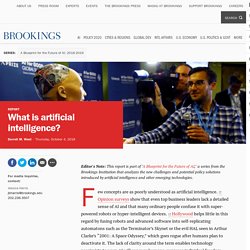
Opinion surveys show that even top business leaders lack a detailed sense of AI and that many ordinary people confuse it with super-powered robots or hyper-intelligent devices. Hollywood helps little in this regard by fusing robots and advanced software into self-replicating automatons such as the Terminator’s Skynet or the evil HAL seen in Arthur Clarke’s “2001: A Space Odyssey,” which goes rogue after humans plan to deactivate it. The lack of clarity around the term enables technology pessimists to warn AI will conquer humans, suppress individual freedom, and destroy personal privacy through a digital “1984.” Part of the problem is the lack of a uniformly agreed upon definition. Alan Turing generally is credited with the origin of the concept when he speculated in 1950 about “thinking machines” that could reason at the level of a human being.
Dlaczego sztuczna inteligencja chciałaby zniszczyć Ludzkość? Elon Musk, Steven Hawking i im podobni obawiają się powstania sztucznej inteligencji. Robot "Zofia" który chce zniszczyć ludzkość. Ludzkość wyginie w ciągu 100 lat? How Artificial Intelligence Will Make Decisions In Tomorrow’s Wars. Artificial intelligence isn't only a consumer and business-centric technology. Yes, companies use AI to automate various tasks, while consumers use AI to make their daily routines easier. But governments–and in particular militaries–also have a massive interest in the speed and scale offered by AI.
Nation states are already using artificial intelligence to monitor their own citizens, and as the U.K.'s Ministry of Defence (MoD) revealed last week, they'll also be using AI to make decisions related to national security and warfare. The MoD's Defence and Security Accelerator (DASA) has announced the initial injection of £4 million in funding for new projects and startups exploring how to use AI in the context of the British Navy. In this first wave of funding, the MoD will share £1 million between nine projects as part of DASA’s Intelligent Ship–The Next Generation competition. On the one hand, such an adaption is a necessary response to the ever-changing nature of inter-state conflict.
Will Artificial Intelligence Replace Us? Artificial Intelligence. Artificial intelligence (AI), sometimes known as machine intelligence, refers to the ability of computers to perform human-like feats of cognition including learning, problem-solving, perception, decision-making, and speech and language. Early AI systems had the ability to defeat a world chess champion, map streets, and compose music. Thanks to more advanced algorithms, data volumes, and computer power and storage, AI evolved and expanded to include more sophisticated applications, such as self-driving cars, improved fraud detection, and “personal assistants” like Siri and Alexa. Today, medical researchers are using AI to develop technology that will detect a range of diseases, improve radiology imaging, fine-tune radiation treatments, simplify DNA sequencing, and advance precision medicine for more individualized health care.
#2 Dokąd zmierza Sztuczna Inteligencja? A.I. - The Movie: Robot Love. Spielberg's latest movie: Artificial Intelligence is about a new age possibility - synthetic love. The idea for the movie came from a 1969 short story by Brian Aldiss - Supertoys Last All Summer Long. Stanley Kubrick (2001: A Space Odyssey, ’68 the movie with HAL the computer) worked on this material for 15 years, before passing it on to Steven Spielberg before he died. The movie is set in the future - global warming has drowned the world's coastlines, but life is pleasant in the small high-tech, cloistered suburbs where elite human survivors live, thanks to the exploitation of “mechas” - humanoid robots of all types. A.I. Will Enhance — Not End — Human Art. Ron Mayer - Translator - Human A.I.